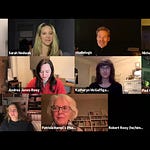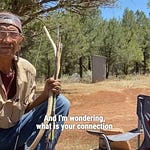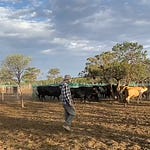Walking through a vibrant section of Tulsa, I stopped to listen to three Indigenous and one Black musician play traditional Pawnee music on the sidewalk. The group was led by a Pawnee-Seminole rhythmist named Cenc. His hair was cut very close to the scalp around a tight man bun. A small crowd listened respectfully. Cenc told me the music offered healing for the city. President Trump was coming to town for his first rally since the pandemic began, Juneteenth was happening, and it was the anniversary of the Greenwood Massacre that destroyed a wealthy black neighborhood in 1921. Given all that was happening, many people predicted massive protests.
Tulsa is home to more than rich men and oil. Videos and photographs by Stephen
I wasn’t interested in staying around. I did not feel passionately about political ideas at the moment. I was trying to figure out what was real and what was fake in the world around me. I’d once been so certain, but now, at 62, I wasn’t.
“You and I see a different world,” my daughter, Violet, once told me. “We see a different America.”
In so many ways, the beliefs I’d held that once seemed patriotically lefty, had become dated. Yet, slowly, I’d come to see a different America too. In books like 1491, The Heart of Wounded Knee, I’d found reason to question history. In conversations with my kids, I’d come to see that America, had a much darker side than I’d ever truly accepted, even after coming of age in the 70s. Still, as always, I took refuge in the myths of unwavering exceptionalism we’d been taught throughout our lives. For many of us, those myths were still so hard to shake.
I got in my truck and headed towards Texas.
I carried an analog atlas on the passenger seat, for the pleasure of discovery that digital maps couldn’t replicate. I pulled over to scan the pages, trying to find the most interesting route. These names of Oklahoma towns jumped off the page at me:
Tulsa
Broken Arrow
Osage
Muskogee
Shawnee
Sapulpa
Tahlequah
Chickasha
Choctaw
Okmulgee
Seminole
Tecumseh
The Oklahoma map spoke of Indianism, of tribal movement, ancient history, arts, and culture from the Native American diaspora. Strangely, this diaspora was internal, having taken place within the Indigenous homelands. Tribes and kinship groups were moved around at the will of European Americans, who intended to steal the land they wanted. The Indians were displaced within their own nations. The fairy tale of westward expansion was that it was inevitable, and, ultimately, fair in a uniquely American way. The cowboys (many of whom were Black both enslaved and free) were the highest ideal of the American spirit. I was fed this nonsense all through my childhood (except the part about Black cowboys — they never came up).
In truth, this country had been as internally genocidal as any on earth, worse than Myanmar, no better than Cambodia. Even as we touted our greatness, we destroyed the First Communities. These place names on the map were leftovers from civilizations that we decimated and then abandoned. Many members of the diaspora, such as the Choctaw, Cherokee, Seminole and others, were forcibly sent from southeast “Indian Territory” to present day Oklahoma. And then were moved on from there. Alexis de Tocqueville described the removal of Choctaw people from the Memphis, Tennessee in 1831:
In the whole scene there was an air of ruin and destruction, something which betrayed a final and irrevocable adieu; one couldn't watch without feeling one's heart wrung. The Indians were tranquil but somber and taciturn. There was one who could speak English and of whom I asked why the Chactas were leaving their country. "To be free," he answered, could never get any other reason out of him. We ... watch the expulsion ... of one of the most celebrated and ancient American peoples.
— Democracy in America
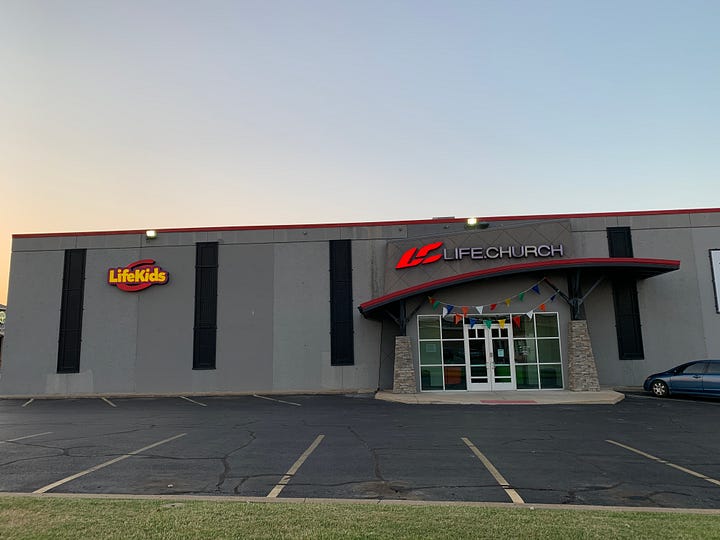
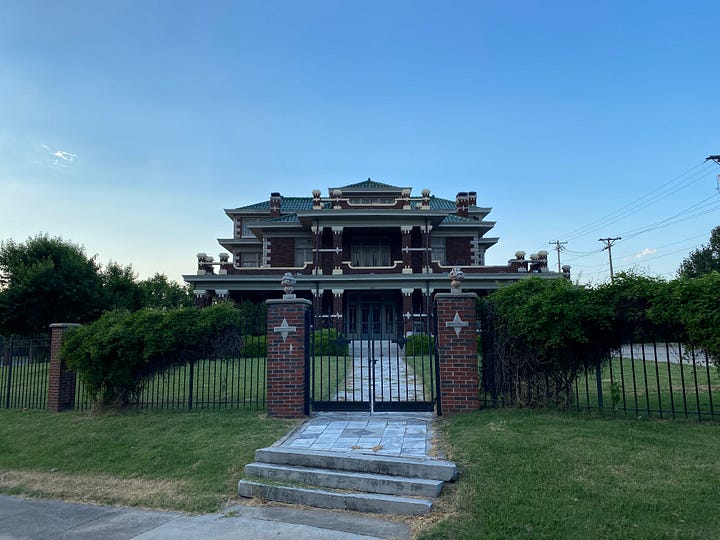
Tulsa has neighborhoods of showy houses. Can anyone explain the influences on this bad boy, above. Tulsa also deals in religion, as evidenced by the Life Church. LifeKids is designed to “help families raise fully devoted followers of Christ.”
These days, to most Americans, Oklahoma was the ancestral home of all the tribes named above. But in truth, the land originally was home only to the following tribes, whose names I also found as small towns on the map. All the other tribes were immigrants:
Apache
Arapaho
Comanche
Kiowa
Wichita
Osage Lake
Most of these little towns in Oklahoma with the names of the original tribes now were in some level of decline.



